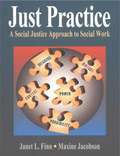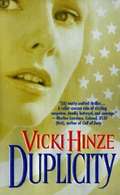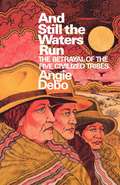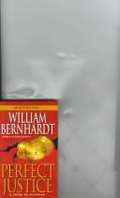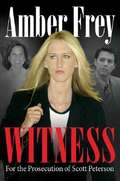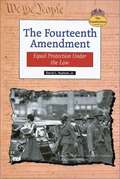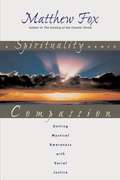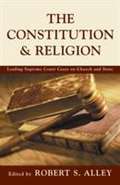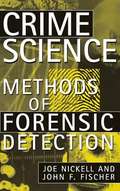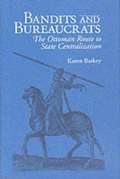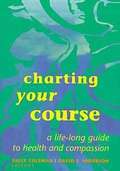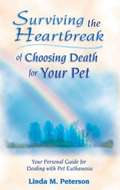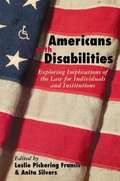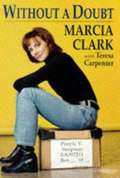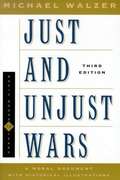- Table View
- List View
Just Practice: A Social Justice Approach to Social Work
by Janet L. Finn Maxine JacobsonSocial work in the 21st century calls for new ways of thinking and acting in order to address these challenges and realize our professional commitment to social justice.
Duplicity
by Vicki HinzeCaptain Tracy Keener, a military lawyer, is ordered to defend a fellow officer accused of treason, cowardice, and of murdering his own men in what promises to be a volatile, highly publicized case. But Adam claims he's been set up.
The Myth of Moral Justice: Why Our Legal System Fails to do What's Right
by Thane RosenbaumA book about the conflict that people experience when they need to inter the legal system. How what justice they get in the courts is not neceesarily moral or right. The author shows why people are disillusioned with lawyers and the legal system itself due to its non-emotional and only following pressetence, following the previous cases on the subject rather than looking at this individual's issue as a brand new situation.
And Still the Waters Run: The Betrayal of the Five Civilized Tribes
by Angie DeboEVERY schoolboy knows that from the settlement of Jamestown to the 1870's Indian warfare was a perpetual accompaniment of American pioneering
Perfect Justice (Ben Kincaid Series #4)
by William BernhardtHate among townspeople and recent Vietnamese arrivals sparks trouble for lawyer Ben.
Witness for the Prosecution of Scott Peterson
by Amber FreyWitness is the chilling story of how a young woman became ensnared in Scott Peterson's web of lies, then risked everything to seek justice for Laci Peterson and her unborn child, Conner. It is also a story of forgiveness and faith, and of one woman's struggle to live with an open and honest heart.
The Fourteenth Amendment
by David L. HudsonIn The Fourteenth Amendment: Equal Protection Under the Law, author David L. Hudson, Jr., explores the significance of the Fourteenth Amendment through the country's history and legal cases. He discusses why there was a need for this amendment, how it was created, and fully explains the major sections and clauses. This amendment forever changed Constitutional law and will continue to have an impact on legal cases in the future.
The Bill of Rights in the Modern State
by Cass R. Sunstein Richard A. Epstein Geoffrey R. StonePapers from a symposium at the University of Chicago celebrating the bicentennial of the Bill of Rights.
A Spirituality Named Compassion: Uniting Mystical Awareness with Social Justice
by Matthew FoxIn A Spirituality Named Compassion, Matthew Fox, the popular and controversial author, establishes a spirituality for the future that promises personal, social, and global healing. Using his own experiences with the pain and lifestyle changes that resulted from an accident, Fox has written an uplifting book on the issues of ecological justice, the suffering of Earth, and the rights of her nonhuman citizens. Fox defines compassion as creativity put to the service of justice and argues that we can achieve compassion for both humanity and the environment as we recognize the interconnectedness of all things. Working toward the creation of a gentler, ecological, and feminist Christianity, Fox marries mysticism and social justice, emphasizing that as we enter a new millennium society needs to realize that spirituality's purpose is to guide us on a path that leads to a genuine love of all our relations and a love for our shared interdependence.
The Constitution and Religion: Leading Supreme Court Cases on Church and State
by Robert S. AlleyA comprehensive look at the Supreme Court's decisions regarding the separation of Church and State.
Crime Science: Methods of Crime Detection
by Joe Nickell John F. FischThis method is empirical (from the Latin empiricus, "experienced"), meaning that knowledge is gained from direct observation.
Hoax (Butch Karp and Marlene Ciampi #16)
by Robert K. TanenbaumDistrict Attorney Butch Karp resolves the problems of New York City and, at the same time, the problems of his own complex family.
A Man to Slay Dragons
by Meagan MckinneyThe ad in the mercenary magazine High Risk was clear. Someone wanted a gun-for-hire. FBI hate crime specialist Liam Jameson is assigned to investigate.
501 Practical Ways to Teach Your Children Values
by Bobbie ReedHow to teach your children values from a Biblical perspective
The Double Edged Helix: Social Implications of Genetics in a Diverse Society
by Adrienne Asch Jon Beckwith Peter Conrad Lisa N. Geller Joseph Alper Catherine ArdThe authors address the medical and ethical implications of the new technologies, outlining potential positive and negative effects of genetic research on minorities, people with disabilities, and those of diverse sexual orientations. Presenting a wide array of perspectives, this book emphasizes the need to ensure that research into genetics does not result in discrimination against people on the basis of their DNA.
Bandits and Bureaucrats The Ottoman Route the State Centralization
by Karen BarkeyDiscusses the process of state-building in the Ottoman Empire.
Charting your Course: A Life-Long Guide to Health and Compassion
by David Anderson Sally ColemanAlthough this is a textbook written for young people, its applications are much broader: the person thinking about career change; the young parent; the new grandparent; the spiritual leader/planner. "Charting Your Course is based on Seven Health Principles. Each principle identifies a vital area of life and presents a healthy orientation toward that area. The seven areas are attitude, personal values, holistic health, relationships, community, the natural world, and service to others."
Surviving the Heartbreak of Choosing Death for Your Pet
by Linda H. PetersonThis book helps in dealing with the issues associated with pet loss specifically when euthanasia is involved: It delves into the decision-making process as well as the feelings of guilt that often times overwhelm you as the loss sets in. Wonderful book for anyone who is having trouble coming to terms with the decision or feelings that have followed such a decision
Some Choice: Law, Medicine, and the Market
by George J. AnnasThe authors goal is to help open a deep and democratic dialogue on health and human rights that trancends slogans and chants, and can lead to local, national, and international cooperation to define, protect, and promote both health and human rights.
Property Law: Rules, Policies and Practices (Third Edition)
by Joseph William SingerHailed as a “vast, superb history [that] relates Scotland’s past over a dozen millennia” (Kirkus Reviews), Magnusson draws on a great deal of modern scholarship to redefine a nation’s history. He charts the long struggle toward nationhood, explores the roots of the original Scots, and examines the extent to which Scotland was shaped by the Romans, the Picts, the Vikings, and the English. Encompassing everything from the first Mesolithic settlers in 7000 B.C. to the present movements for independence, Scotland: The Story of a Nation is history on an epic level, essential reading for anyone interested in the rich past of this captivating land.
Americans with Disabilities: Exploring Implications of the Law for Individuals and Institutions
by Anita Silvers Leslie Pickering FrancisFew laws have sparked as much debate as the Americans with Disabilities Act (ADA), passed by Congress in 1990. With thought-provoking analysis by noted experts in a variety of fields, this book provides a keen understanding of the consequences of the law--for both those who oppose burdensome costs of the law and those who feel it must do more to protect citizens with disabilities from intolerance and social limitation.
Without a Doubt
by Teresa Carpenter Marcia ClarkAs the prosecutor in the OJ Simpson trial, this book is about how Marcia Clark orchestrated the most controversial case of her career.
Just and Unjust Wars: A Moral Argument With Historical Illustrations, 3rd Ed.
by Michael WalzerThis classic work examines the issues surrounding military theory, war crimes, and the spoils of war from the Athenian attack on Melos to the My Lai massacre. A revised and updated classic treatment of the morality of war written by one of our country's leading philosophers. Just and Unjust Wars examines a variety of conflicts in order to understand exactly why, according to Walzer, "the argument about war and justice is still a political and moral necessity." Walzer's classic work draws on historical illustrations that range all the way from the Athenian attack on Melos to this morning's headlines, and uses the testimony of participants-decision makers and victims alike-to examine the moral issues of warfare.
Introduction to the Law and Legal System of the United States (Second Edition)
by William BurnhamGovernmental structure, history, the adversary system, jury trials, the legal profession, the judicial system, administrative law, civil procedures, criminal procedures, constitutional law, contracts and commercial law, torts, property law, family law, criminal law, business law, and tax law.
